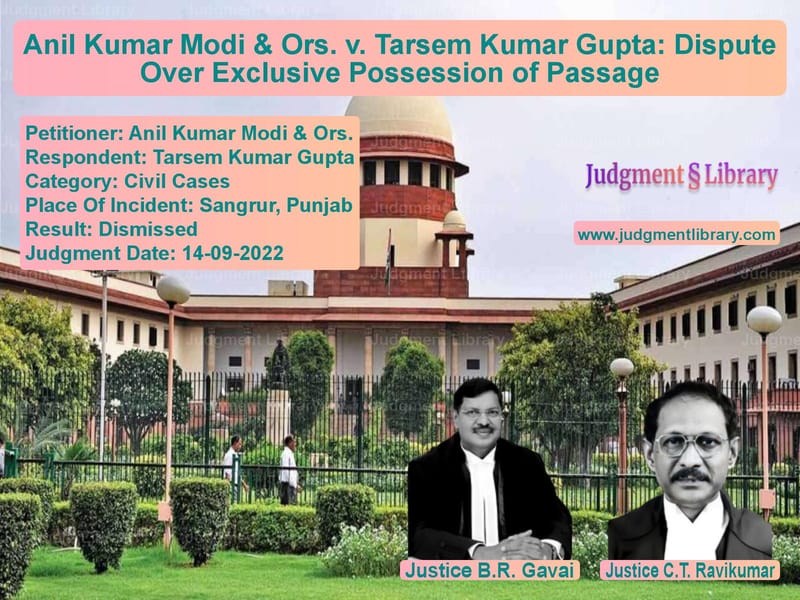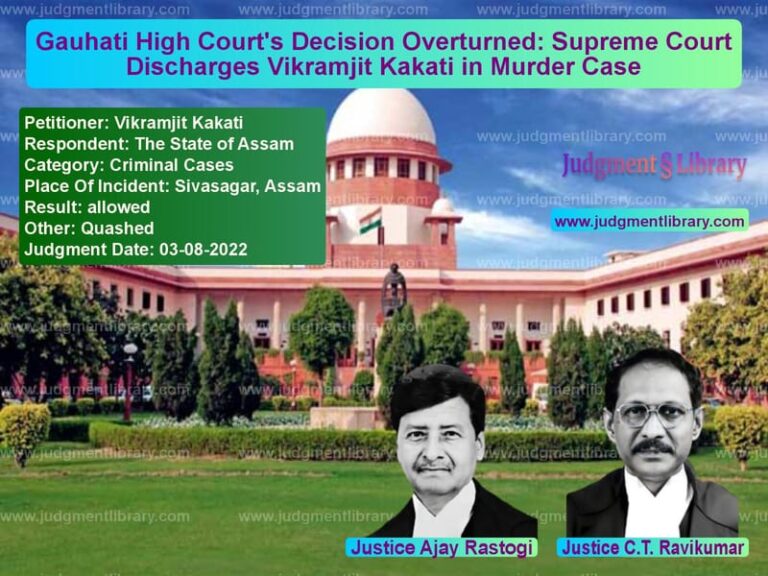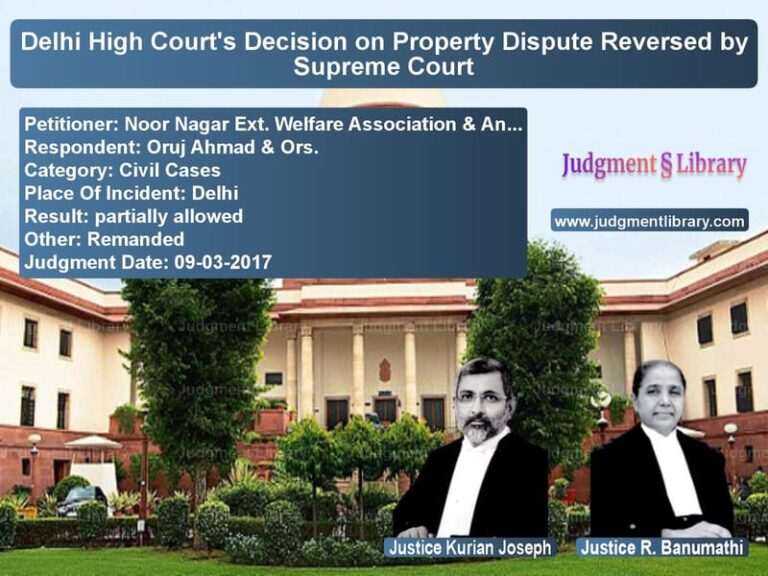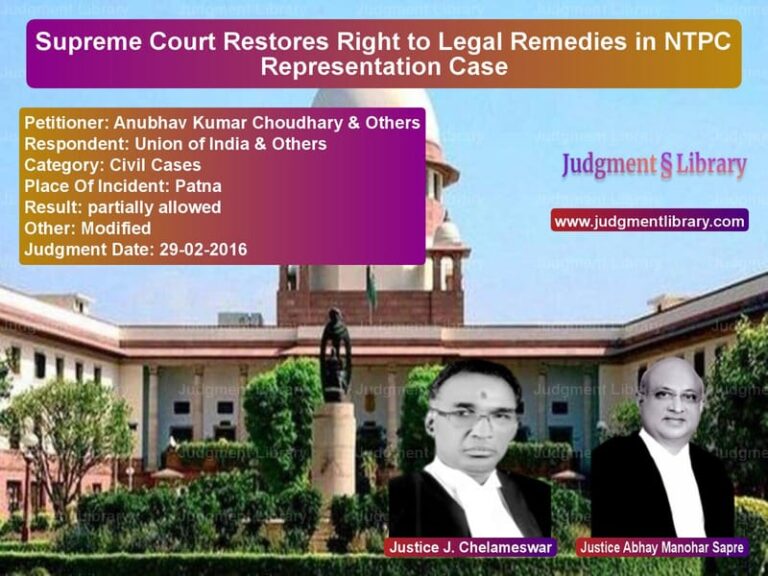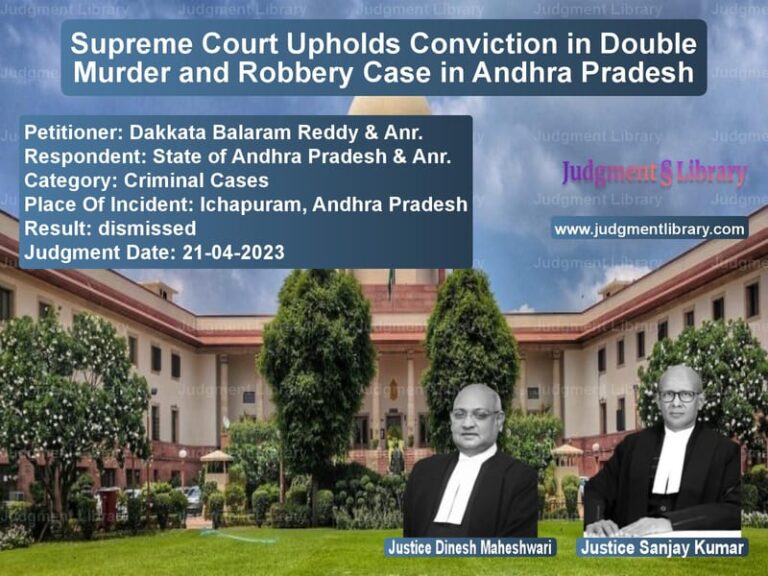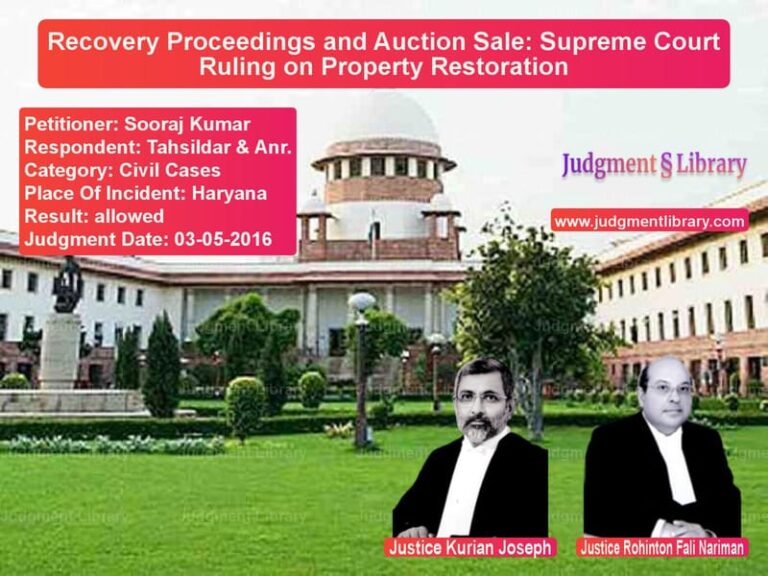Anil Kumar Modi & Ors. v. Tarsem Kumar Gupta: Dispute Over Exclusive Possession of Passage
The case of Anil Kumar Modi & Ors. versus Tarsem Kumar Gupta revolves around a property dispute concerning the possession and use of a passage between two properties. This legal battle is characterized by multiple rounds of litigation and involves questions of exclusive possession and the rights of passage, especially in the context of a sale deed and the construction of structures within the passage. The primary issue before the Supreme Court was whether the respondent, Tarsem Kumar Gupta, was entitled to exclusive possession of a passage, despite the earlier findings in previous legal proceedings.
The dispute dates back to the first round of litigation, where the respondent-plaintiff had filed a suit seeking an injunction against the appellants-defendants, preventing them from removing latrine blocks in the 10-foot passage between their properties. In the first round, the trial court ruled that the respondent-plaintiff had a right to the passage under a sale deed dated October 11, 1954. However, the trial court also found that the respondent did not have the right to construct a latrine in the passage as it infringed upon the easement rights of the appellants, who had the right to open windows and ventilators in the passage. This ruling was challenged in appeal.
The first appellate court affirmed the trial court’s decision, and the second appeal was also dismissed. At this point, the matter seemed to be settled regarding the construction of the latrine, but the issue of exclusive possession of the passage had not been fully resolved. The respondent-plaintiff then filed a second suit, which dealt with the appellants’ attempt to raise a construction and open a door in the same disputed passage. During the pendency of the second suit, a third suit was filed by the respondent on June 1, 2000, seeking an injunction to prevent the appellants from removing bricks that had been placed by the respondent at points marked on a site plan. The appellants counterclaimed, seeking the removal of these bricks from the passage.
Read also: https://judgmentlibrary.com/court-orders-coercive-action-against-husband-in-pending-us-case/
The trial court, in this third suit, dismissed the respondent’s claim and ruled in favor of the appellants, granting their counterclaim. However, the first appellate court reversed this decision, finding in favor of the respondent and ruling that the respondent was entitled to exclusive possession of the passage, with the appellants’ rights limited to opening windows and ventilators. The High Court affirmed the first appellate court’s ruling, dismissing the second appeal filed by the appellants. This led to the current appeals before the Supreme Court.
The appellants argued that the findings of the first appellate court in the earlier round of litigation should operate as res judicata, preventing the issue of exclusive possession from being revisited. They contended that the earlier proceedings had already determined the nature of the respondent’s rights to the passage, and therefore, the first appellate court and the High Court had erred in ruling that the respondent was entitled to exclusive possession. The appellants relied on previous judgments of the Supreme Court, particularly the cases of R. Unnikrishnan & Anr. v. V.K. Mahanudevan and K. Arumuga Velaiah v. P.R. Ramasamy & Anr., to argue that the principle of res judicata should apply in this case.
On the other hand, the respondent-plaintiff’s counsel argued that the first appellate court and the High Court had correctly interpreted the sale deed, which granted the respondent exclusive possession of the passage. The respondent’s counsel emphasized that the only right available to the appellants was to open windows and ventilators in the passage, and that the respondent was fully entitled to exclusive use of the passage. The respondent’s counsel argued that the previous legal proceedings had focused on a different issue – the construction of the latrine – and did not address the issue of exclusive possession, which was central to the current dispute.
The Supreme Court carefully considered the arguments presented by both sides, particularly the issue of whether the findings in the earlier rounds of litigation could operate as res judicata in the present case. The Court noted that the previous proceedings had dealt with the issue of whether the respondent had the right to construct a latrine in the passage, but did not specifically address the question of exclusive possession. Therefore, the Court held that the issue of exclusive possession had not been decided in the earlier rounds and could be properly adjudicated in the current proceedings.
The Supreme Court also examined the interpretation of the sale deed and the rights it conferred upon the respondent. The Court found that the first appellate court and the High Court had correctly interpreted the sale deed, which granted the respondent the right to exclusive possession of the passage. The Court emphasized that while the appellants had the right to open windows and ventilators in the passage, this right was limited in scope and did not extend to interfering with the respondent’s exclusive possession of the passage.
Ultimately, the Supreme Court dismissed the appellants’ appeals and upheld the concurrent findings of the first appellate court and the High Court. The Court ruled that the respondent was entitled to exclusive possession of the passage, and the appellants’ rights were limited to opening windows and ventilators. The Court also concluded that the principle of res judicata did not apply in this case, as the issue of exclusive possession had not been adjudicated in the earlier proceedings.
This case highlights the complexities involved in property disputes, particularly when it comes to interpreting sale deeds and determining the extent of rights to passages and other shared spaces. It also underscores the importance of clearly defining rights in property transactions to avoid protracted legal battles. The decision of the Supreme Court reaffirms the principle that exclusive possession can be granted to a party even in the presence of shared rights, as long as the terms of the relevant documents support such a claim.
Petitioner Name: Anil Kumar Modi & Ors..Respondent Name: Tarsem Kumar Gupta.Judgment By: Justice B.R. Gavai, Justice C.T. Ravikumar.Place Of Incident: Sangrur, Punjab.Judgment Date: 14-09-2022.
Don’t miss out on the full details! Download the complete judgment in PDF format below and gain valuable insights instantly!
Download Judgment: anil-kumar-modi-&-or-vs-tarsem-kumar-gupta-supreme-court-of-india-judgment-dated-14-09-2022.pdf
Directly Download Judgment: Directly download this Judgment
See all petitions in Contract Disputes
See all petitions in Property Disputes
See all petitions in Succession and Wills
See all petitions in Specific Performance
See all petitions in Damages and Compensation
See all petitions in Judgment by B R Gavai
See all petitions in Judgment by C.T. Ravikumar
See all petitions in dismissed
See all petitions in supreme court of India judgments September 2022
See all petitions in 2022 judgments
See all posts in Civil Cases Category
See all allowed petitions in Civil Cases Category
See all Dismissed petitions in Civil Cases Category
See all partially allowed petitions in Civil Cases Category

